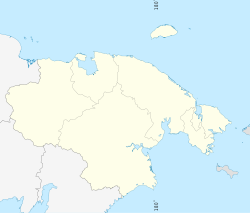Billings, Chukotka Autonomous Okrug
| Billings (English) Биллингс (Russian) Валкыран (Chukchi) |
|
|---|---|
| - Rural locality - Selo |
|
 Nighttime view of Billings |
|
 Location of Chukotka Autonomous Okrug in Russia |
|
|
|
|
|
|
|
| Administrative status (as of June 2009) | |
| Country | Russia |
| Federal subject | Chukotka Autonomous Okrug |
| Administrative district | Iultinsky District |
| Municipal status (as of October 2010) | |
| Municipal district | Chaunsky Municipal District |
| Rural settlement | Billings Rural Settlement |
| Administrative center of | Billings Rural Settlement |
| Statistics | |
| Population (2010 Census) | 211 inhabitants |
| Population (January 2016 est.) | 193 inhabitants |
| Time zone | PETT (UTC+12:00) |
| Postal code(s) | 689380 |
| Dialing code(s) | +7 42737 |
| on | |
Billings (Russian: Би́ллингс) is a rural locality (a selo) in Iultinsky District of Chukotka Autonomous Okrug, Russia. Population: 211 (2010 Census);Municipally, it is incorporated as Billings Rural Settlement in Chaunsky Municipal District.
Like Mys Shmidta, Billings is named after a nearby cape, which in turn was named after British Captain Joseph Billings (1758—1806) who was at the service of the Russian Imperial Navy during Catherine the Great's reign. The cape itself marks the point of separation between the Chukchi Sea and the East Siberian Sea. Joseph Billings was an English-born member of the Russian navy who in 1785, together with C. G. Sarychevym, was part of the expedition that mapped and researched the coast of North-Eastern Siberia. Using reindeer, he crossed Chukotka as far as Kolyuchinskaya Guba and mapped the area.
The local Chukchi people originally called the place "Valkyran", meaning a dugout of whale jaws. This is in reference to the remains of an ancient Inuit camp consisting of a number of homes dug into the soil and constructed of wood and the bones of the Greenland whale.
In 1935, a polar station was established on the site of the village for the first time, and two years later the first national council was established in the area named Valkyran after their traditional name for the area. In 1948, the local Chukchi herders were collectivised and named their new Sovkhoz after Lenin.
...
Wikipedia

